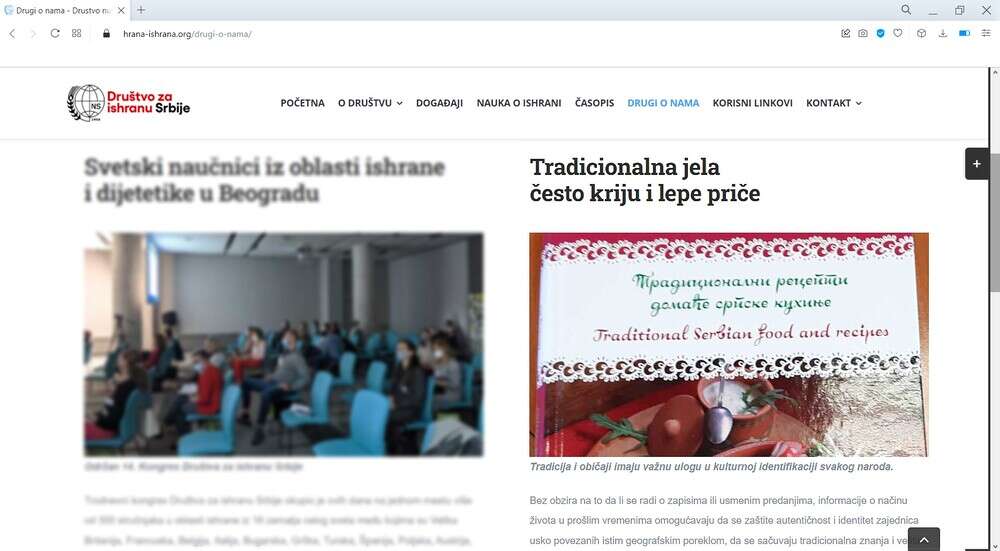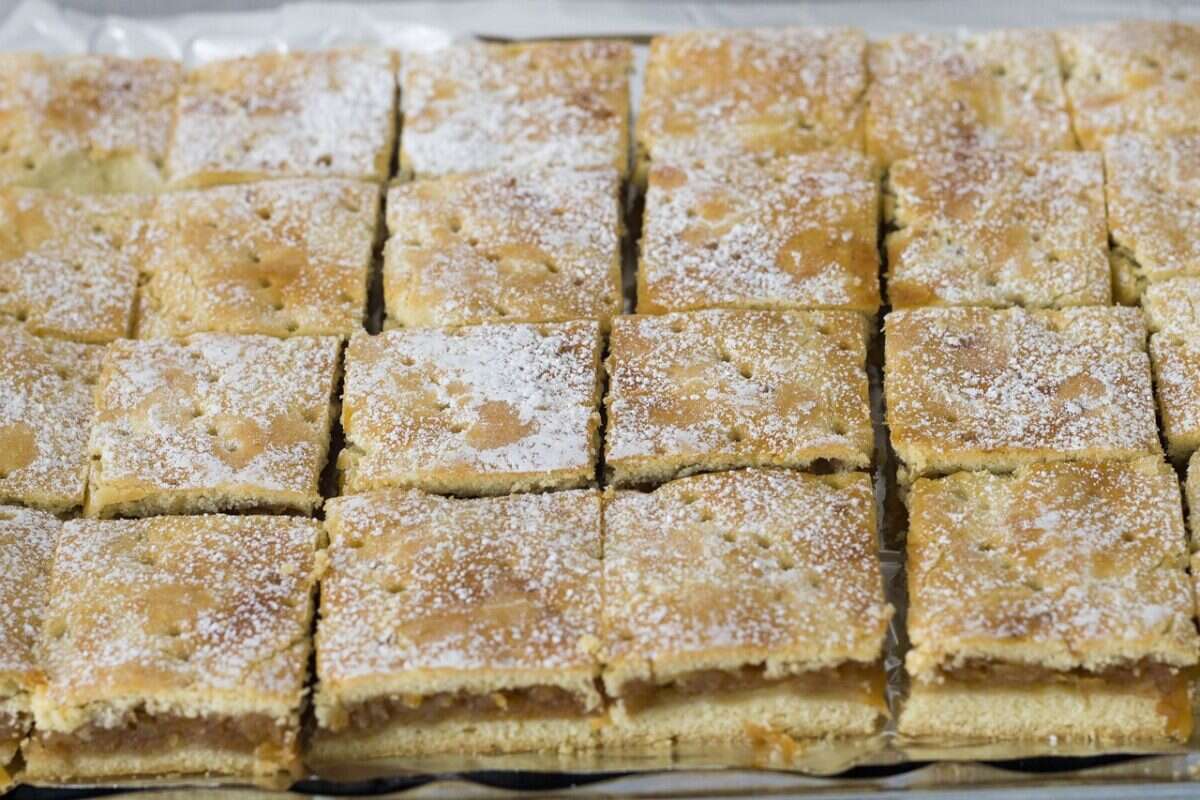
Prof. Dr. Slađana Šobajić, 10.06.2018., site Danas: Traditional dishes often hide beautiful stories, posted on the site Society for Nutrition of Serbia, about the book Traditional recipes of Serbian cuisine.
Tradition and customs play an important role in the cultural identification of each nation.
Regardless of whether it is records or oral traditions, information about the way of life in past times allows to protect the authenticity and identity of communities closely linked by the same geographical origin, to preserve traditional knowledge and skills that may no longer be necessary, but represent part of the historical heritage. Traditional food, as a product of the environment, natural resources, but also culture, history and way of life in a certain area, has an important role in the overall tradition of each nation. All peoples, countries, ethnic communities have specific eating habits that differ to a greater or lesser extent from the habits of other communities. They are passed down from one generation to another, play an important role in the folklore and customs of certain regions for hundreds and even thousands of years and contribute to the overall cultural diversity.
Thinking about the laudable project of Miodrag Ilić, who decided to make a great effort and collect traditional recipes of Serbian cuisine, I realized, unfortunately, that today much more is known, talked about, admired and written about the culinary skills of other countries than about our own. That we know who, where and when first made a saher cake, but that we don't know the history and beautiful love story behind Vasa's cake, designed and first made in Belgrade. We know almost everything about the Italian national dough dish - pizza (pizza), but that's why we miss the secret stories and traditions related to the preparation of belmuža (a dish from eastern Serbia made from corn flour and cheese), samse (a dish from southern Serbia made from crust, garlic and sour milk), bungura (wheat dish). Today's generations only remember from their childhood the taste of home-cooked dishes such as cicvara, popara, ravania, chomlek, mamalyuga, gomboce, and new generations will not know how their grandparents grew up with a table where there were dishes that they did not like didn't even hear. If we do not make an effort, in addition to the names and recipes of the dishes, many words related to cuisine, cooking, and foodstuffs will also be forgotten - hundreds of words will disappear from the dictionary, from memory, and with them part of past eras, part of our tradition and history. Even today, one says "what coppers" for something that is unimportant, but if you ask what copper is, hardly anyone will know that it is a Turkish word domesticated in the Serbian language for cauldron, cauldron. Today, bread is bought in stores, and if the housewife wants to show her skills in the kitchen, she will knead homemade bread, but hardly any of the household members will know what the expression "kneaded full loaves of dough" means, even though just 100 years ago, all houses in Serbia had a kitchen. had their naćves (wooden vessels) for mixing bread dough.
Our traditional dishes often hide beautiful stories, some true, some fictional. It is known, e.g. that Karađorđe always carried a bowl of papula on his belt - a dish made of crushed white beans, and today almost no one knows what a papula is. King Milan Obrenović is said to have often, as if by chance, stopped by his minister Gligorij Geršić for lunch, always when the minister's wife was making stuffed zucchini, which the king adored. And Evlija Celebija, a travel writer from the 17th century, described Belgrade's baklava "as big as a cart wheel" as the best he had ever tasted.
Not only Serbia, but the whole world is threatened by the danger of forgetting traditional foods, traditional food, traditional ways of preparing food. Globalization has contributed to the diversity of the food supply, but it has also contributed to the accelerated change in lifestyle, the adoption of other people's dietary habits and led to the so-called "nutritional transitions" towards a simplified diet with poorer nutritional characteristics. The epidemic of obesity, "hidden hunger" or invisible deficits of minerals and vitamins, the increase in the number of people suffering from chronic non-communicable diseases, are the consequences of a changed way of life and a changed way of eating. Traditional diet, in addition to its place in history and tradition, has satisfied the nutritional needs of the population for centuries, enabling its survival thanks to its composition, quality and nutritional characteristics that correspond to a certain geographical region. For the preparation of traditional dishes, locally grown raw foods are mainly used, so the preservation of traditional food is at the same time a contribution to the preservation of the diversity of local traditional agricultural production.
Because of the importance that traditional food has in preserving the cultural heritage of a country or community, but also because of preserving the diversity of food and dietary habits and achieving an adequate nutritional status, it is very important to document traditional food, preserve old recipes and old ways of preparing food. The study of traditional food provides important insight into the way of eating and how it has changed over time. Several large European projects, such as TRUEFOOD, BaSeFood and EuroFIR, were dedicated to this topic.
The book "Traditional recipes of domestic Serbian cuisine" is a research effort that is in line with the trend of rediscovering traditional food in the world. With this book, Miodrag Ilić tries to identify the dishes with which our ancestors grew and survived on the territory of Serbia for centuries, and which are threatened with oblivion. Detailed records of the recipes of traditional dishes in Serbia contribute to their revitalization, but this also achieves the standardization of the composition and quality of the dishes and enables their easier inclusion in the modern diet. This is also a way to preserve the legacy of our ancestors for new generations.
The book "Traditional recipes of domestic Serbian cuisine" is a treasure trove of data that tells not only about the composition of the dishes, but also about a way of life that is slowly but irreversibly disappearing. About the way of life when cooking was for the family, when there was time for long meal preparation, when the whole family sat at the table and when frozen or reheated meals were unknown. Flipping through the book, reading the recipes, you will almost feel the smell of these freshly prepared and delicious dishes, and I hope that you will want to prepare some of these dishes for yourself and your loved ones, and thus, together with Miodrag Ilić, take a step towards preserving the local culinary tradition from forget.
Prof. Dr. Slađana Šobajić is a full professor at the Department of Bromatology, Faculty of Pharmacy, University of Belgrade. Master's degree in 1991 at the Faculty of Pharmacy in Belgrade. She defended her doctorate in 1996 at the Faculty of Pharmacy in Belgrade, for which she received the Galenike award for the best doctoral dissertation.
At the Department of Bromatology, Dr. Slađana Šobajić participates in the teaching of integrated academic studies in both majors within the subjects of Bromatology, Food Safety Control 1 and 2 and Dietetics, as well as in post-graduate studies - academic specialist studies, health specialization and doctoral studies.
Since 1996, Dr. Slađana Šobajić has been participating in the projects of the Ministry of Science, Technology and Development of the Republic of Serbia. She is the co-author of 132 scientific and professional papers, of which 26 papers are in journals from the SCI list with an impact factor, and 35 papers are in national journals. She is the co-author of a university textbook. She is a member of the Ethics Committee for Clinical Trials, then the Faculty Council and the Commission for Doctoral Studies.
Dr. Slađana Šobajić has been the president of the Society for Nutrition of Serbia since 2008.
Dr. Šobajić's research interest is in the fields of food chemistry and dietary products, physiological, biochemical, health effects of food ingredients, assessment of the intake of nutrients, additives and contaminants, in lipidology.
READ: WHERE CAN I BUY THE BOOK TRADITIONAL RECIPES OF HOME SERBIAN CUISINE?
Read more:
The Recipes and Kuvar online portal is ranked among the TOP 50 websites in Serbia!
Don't miss a recipe - Recipes and cookbook online on Facebook. Stay tuned, follow the Recipes and Cookbook twitter notifications!






